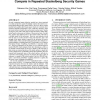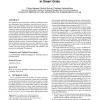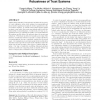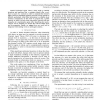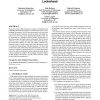ATAL
2015
Springer
9 years 10 months ago
2015
Springer
Several competing human behavior models have been proposed to model and protect against boundedly rational adversaries in repeated Stackelberg security games (SSGs). However, thes...
86
Voted
ATAL
2015
Springer
9 years 10 months ago
2015
Springer
Next generation of smart grids face a number of challenges including co-generation from intermittent renewable power sources, a shift away from monolithic control due to increased...
ATAL
2015
Springer
9 years 10 months ago
2015
Springer
Unfair rating attacks to trust systems can affect the accuracy of trust evaluation when trust ratings (recommendations) about trustee agents are sought by truster agents from oth...
ATAL
2015
Springer
9 years 10 months ago
2015
Springer
Computational social choice (comsoc) theory is currently an important area of research in computer science and more specifically in AI. The field started with the pioneering wor...
ATAL
2015
Springer
9 years 10 months ago
2015
Springer
In recent years there has been an increasing interest in social concepts that might contribute to new advances on social intelligence and believability in agents. A key social con...
ATAL
2015
Springer
9 years 10 months ago
2015
Springer
This paper describes an architecture for robots interacting with non-expert humans to incrementally acquire domain knowledge. Candidate questions are generated using contextual in...
ATAL
2015
Springer
9 years 10 months ago
2015
Springer
—Principal Agent Theory (PAT) seeks to identify incentives and sanctions that a consumer should offer a producer as part of a contract in order to maximise the former’s utility...
91
Voted
ATAL
2015
Springer
9 years 10 months ago
2015
Springer
Norms have been widely proposed as a means of coordinating and controlling the behaviour of agents in a multi-agent system. A key challenge in normative MAS is norm enforcement: h...
ATAL
2015
Springer
9 years 10 months ago
2015
Springer
Brain-Computer Interfaces (BCIs) are playing an increasingly important role in a broad spectrum of applications in health, industry, education, and entertainment. We present a nov...
107
click to vote
ATAL
2015
Springer
9 years 10 months ago
2015
Springer
Voting rules are powerful tools that allow multiple agents to aggregate their preferences in order to reach joint decisions. A common flaw of some voting rules, known as the no-s...
